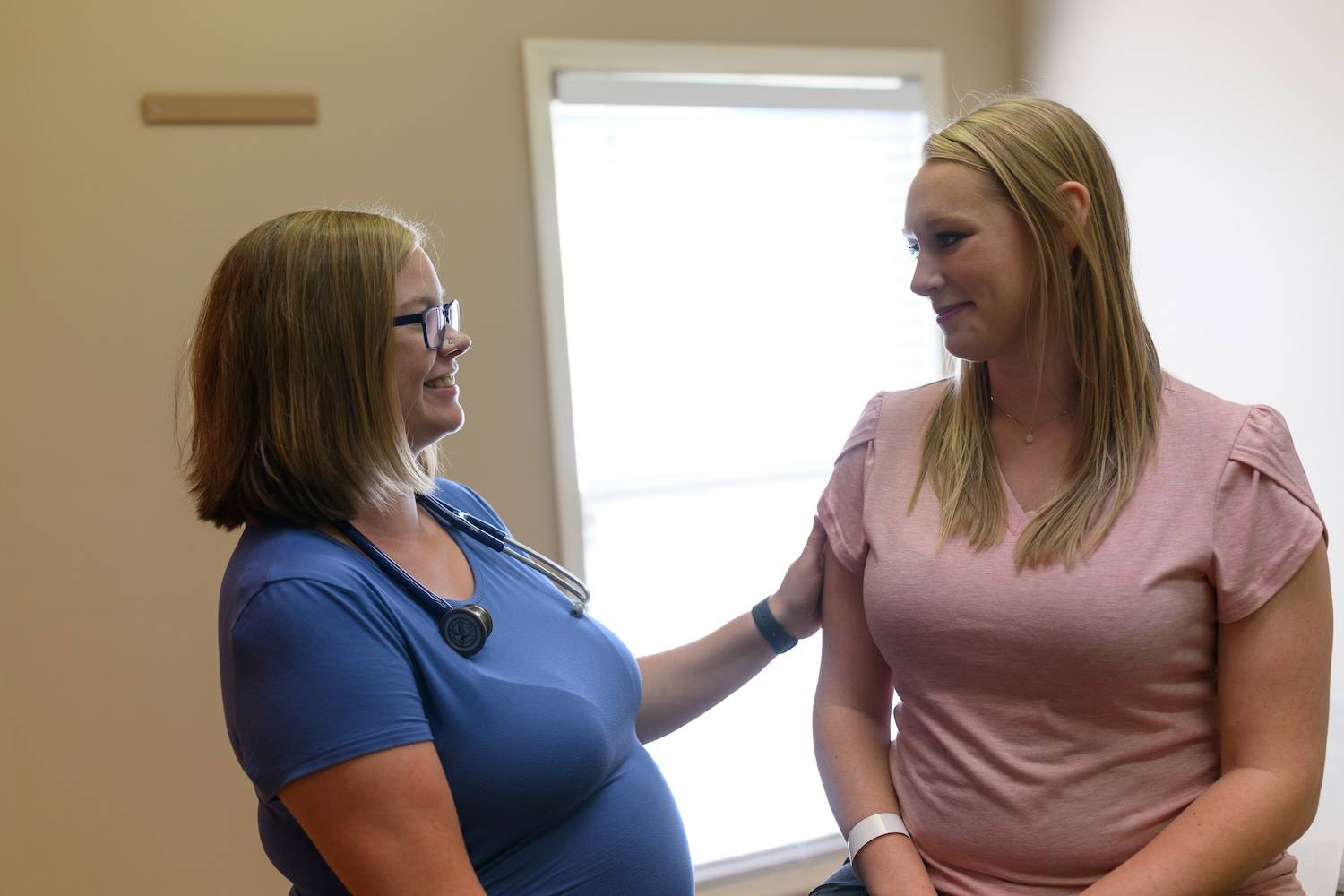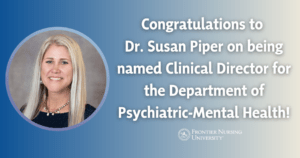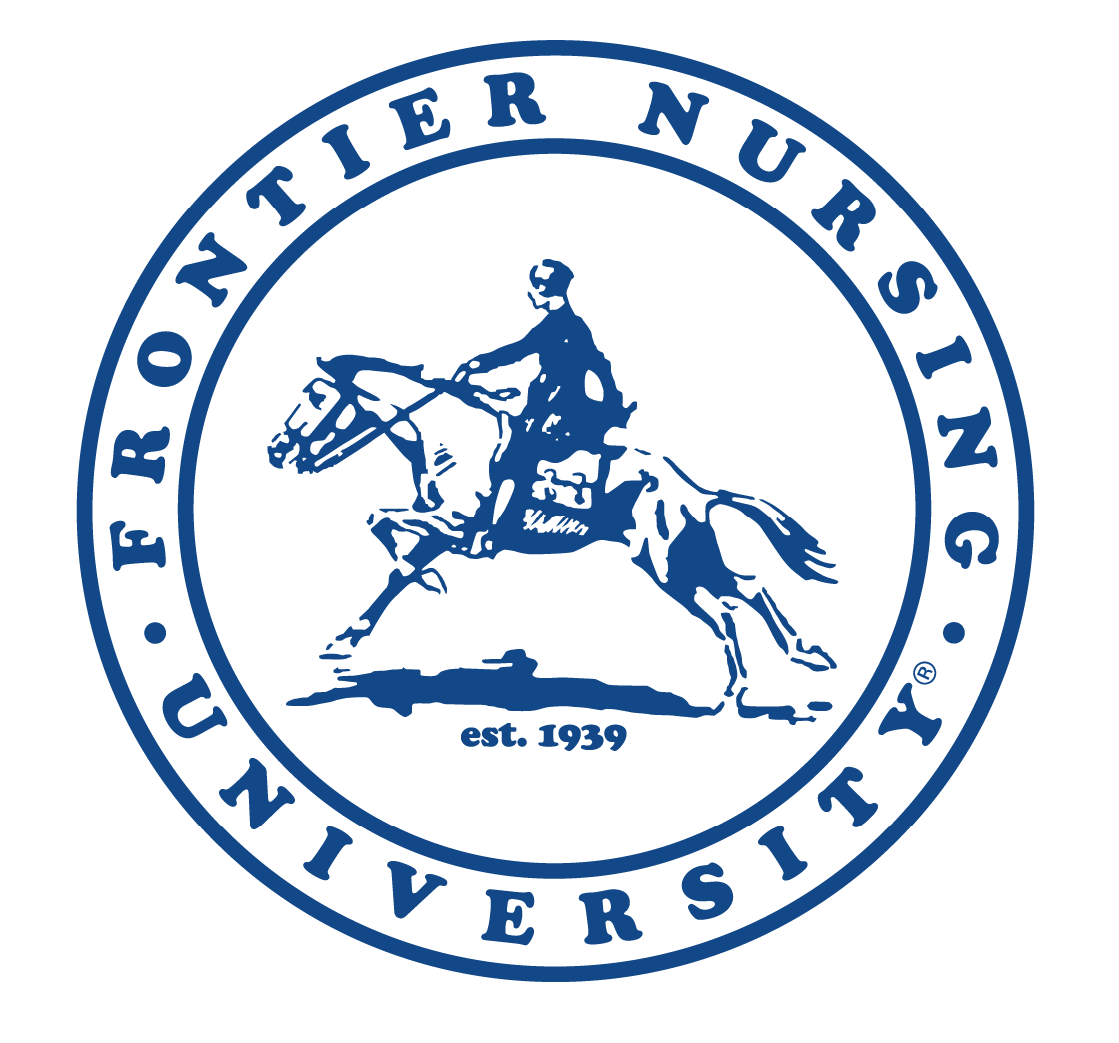For decades, Frontier Nursing University has excelled at preparing nurse-midwifery and nurse practitioner students to become ethical, compassionate, innovative, and entrepreneurial leaders. FNU has long understood the vital roles that nurse-midwives and nurse practitioners play in the nation’s healthcare system. To the general public, however, the different terms and titles can be confusing, yet understanding them grows more important as the U.S. combats significant healthcare shortages and crises across the country.

Even before the start of the COVID-19 Pandemic, it was well-known that the U.S. was facing a healthcare provider shortage. This trend was verified in a June 2021 report by the Association of American Medical Colleges, which estimated the U.S. faces a shortage of primary care physicians of between 17,800 and 48,000 and a shortage across the non-primary care specialties of between 21,000 and 77,100 physicians. (Source: https://www.aamc.org/media/54681/download?attachment)
Perhaps even more disconcerting is the maternal mortality crisis. A maternal death is defined by the World Health Organization as “the death of a woman while pregnant or within 42 days of termination of pregnancy, irrespective of the duration and the site of the pregnancy, from any cause related to or aggravated by the pregnancy or its management, but not from accidental or incidental causes.” According to the Centers for Disease Control (CDC), in 2021, the maternal mortality rate in the United States was 32.9 deaths per 100,000 live births, a dramatic increase from rates of 23.8 in 2020 and 20.1 in 2019. The rate for non-Hispanic Black women is even more alarming, at 69.9 deaths per 100,000 births in 2021. (Source: https://www.cdc.gov/nchs/data/hestat/maternal-mortality/2021/maternal-mortality-rates-2021.pdf)
Answers to systemic problems are complex and involve multiple components, but data suggests that nurse-midwives could help dramatically to improve the nation’s maternal mortality crisis. The Lancet Series on Midwifery found that midwives are linked to higher rates of physiologic birth and fewer adverse neonatal outcomes. The report noted that approximately 10 percent of U.S. births are attended by nurse-midwives, compared to 50-75 percent in other high-resource countries. (Source: https://www.ncbi.nlm.nih.gov/pmc/articles/PMC5821332/#sec004title)
In addition to educating and preparing more nurse-midwives, part of the solution is also an increased awareness of exactly what nurse-midwives do. Taking note of the many myths about nurse-midwives, FNU has made it a strategic priority to be a source of information and education about the vital role of nurse-midwives.
“Nurse-midwives contribute significantly to better care for women and families,” said FNU President Dr. Susan Stone, DNSc, CNM, FACNM, FAAN. “This is why a number of healthcare organizations across the country are embracing collaborative models and adding nurse-midwives to healthcare teams. With their unique skill sets, nurse-midwives help improve quality and decrease costs. They also serve as excellent advocates for patients, which is particularly important as more and more women are seeking out-of-hospital care.”
Certified nurse-midwives (CNMs) are educated in two disciplines: midwifery and nursing. They earn graduate degrees, complete a midwifery education program accredited by the Accreditation Commission for Midwifery Education (ACME), and pass a national certification examination administered by the American Midwifery Certification Board (AMCB).

“An important objective for Frontier Nursing University is to define the role of the certified nurse-midwife so the public understands the broad scope of services these professionals provide,” Dr. Stone said.
FNU’s strategy to educate the public about the difference between nurse-midwives has included sharing informational messages across multiple platforms, including FNU’s publications and communications, including the FNU website, blog, Quarterly Bulletin, e-newsletters, press releases, and myth-busting fact sheets.
Nurse-midwives have a core focus on promoting optimal health, not only caring for the sick but also providing guidance to assist in long-term health. This model of care forms a partnership between nurse and patient with a focus on promoting ongoing health in addition to treating illness. The focus on health maintenance is a core characteristic of the practice of nurse-midwives and nurse practitioners. Midwifery care, as defined by the American College of Nurse-Midwives, includes health promotion, disease prevention, wellness education and counseling, and full-scope primary care services, including maternity care. A 2023 study found that midwifery-led care has many positive effects on improving several key maternal and neonatal outcomes, including fewer emergency Caesarean sections, higher rates of vaginal births, lower rates of episiotomies, and shorter neonatal stays in intensive care units. (Source: https://www.ncbi.nlm.nih.gov )
“Nurse-midwives serve as excellent advocates for patients, which is particularly important as more women seek out-of-hospital care,” Dr. Stone said. “Frontier Nursing University’s goal is to educate more certified nurse-midwives so that midwifery care is available to all women who seek it, and to educate the public about the care that these nurse-midwives can provide.”
Related Content: Why Should I Become a Nurse-Midwife?
Learn more about advanced nursing degrees and specialties at Frontier Nursing University. Subscribe to our blog for the latest news and events at FNU and to get inspired with stories featuring our alumni, students, faculty, preceptors and staff!





 Vanessa Cameron works for Vanderbilt University Medical Center in Nursing Education & Professional Development. She is also attending George Washington University and progressing towards a PhD in Nursing with an emphasis on ableism in nursing. After becoming disabled in April 2021, Vanessa’s worldview and perspective changed, and a recognition of the ableism present within healthcare and within the culture of nursing was apparent. She has been working since that time to provide educational foundations for nurses about disability and ableism, provide support for fellow disabled nursing colleagues, and advocate for the disabled community within healthcare settings to reduce disparities.
Vanessa Cameron works for Vanderbilt University Medical Center in Nursing Education & Professional Development. She is also attending George Washington University and progressing towards a PhD in Nursing with an emphasis on ableism in nursing. After becoming disabled in April 2021, Vanessa’s worldview and perspective changed, and a recognition of the ableism present within healthcare and within the culture of nursing was apparent. She has been working since that time to provide educational foundations for nurses about disability and ableism, provide support for fellow disabled nursing colleagues, and advocate for the disabled community within healthcare settings to reduce disparities. Dr. Lucinda Canty is a certified nurse-midwife, Associate Professor of Nursing, and Director of the Seedworks Health Equity in Nursing Program at the University of Massachusetts Amherst. She earned a bachelor’s degree in nursing from Columbia University, a master’s degree from Yale University, specializing in nurse-midwifery, and a PhD from the University of Connecticut. Dr. Canty has provided reproductive health care for over 29 years. Her research interests include the prevention of maternal mortality and severe maternal morbidity, reducing racial and ethnic health disparities in reproductive health, promoting diversity in nursing, and eliminating racism in nursing and midwifery.
Dr. Lucinda Canty is a certified nurse-midwife, Associate Professor of Nursing, and Director of the Seedworks Health Equity in Nursing Program at the University of Massachusetts Amherst. She earned a bachelor’s degree in nursing from Columbia University, a master’s degree from Yale University, specializing in nurse-midwifery, and a PhD from the University of Connecticut. Dr. Canty has provided reproductive health care for over 29 years. Her research interests include the prevention of maternal mortality and severe maternal morbidity, reducing racial and ethnic health disparities in reproductive health, promoting diversity in nursing, and eliminating racism in nursing and midwifery. Dr. Lisa Meeks is a distinguished scholar and leader whose unwavering commitment to inclusivity and excellence has significantly influenced the landscape of health professions education and accessibility. She is the founder and executive director of the DocsWithDisabilities Initiative and holds appointments as an Associate Professor in the Departments of Learning Health Sciences and Family Medicine at the University of Michigan.
Dr. Lisa Meeks is a distinguished scholar and leader whose unwavering commitment to inclusivity and excellence has significantly influenced the landscape of health professions education and accessibility. She is the founder and executive director of the DocsWithDisabilities Initiative and holds appointments as an Associate Professor in the Departments of Learning Health Sciences and Family Medicine at the University of Michigan. Dr. Nikia Grayson, DNP, MSN, MPH, MA, CNM, FNP-C, FACNM (she/her) is a trailblazing force in reproductive justice, blending her expertise as a public health activist, anthropologist, and family nurse-midwife to champion the rights and health of underserved communities. Graduating with distinction from Howard University, Nikia holds a bachelor’s degree in communications and a master’s degree in public health. Her academic journey also led her to the University of Memphis, where she earned a master’s in medical anthropology, and the University of Tennessee, where she achieved both a master’s in nursing and a doctorate in nursing practice. Complementing her extensive education, she completed a post-master’s certificate in midwifery at Frontier Nursing University.
Dr. Nikia Grayson, DNP, MSN, MPH, MA, CNM, FNP-C, FACNM (she/her) is a trailblazing force in reproductive justice, blending her expertise as a public health activist, anthropologist, and family nurse-midwife to champion the rights and health of underserved communities. Graduating with distinction from Howard University, Nikia holds a bachelor’s degree in communications and a master’s degree in public health. Her academic journey also led her to the University of Memphis, where she earned a master’s in medical anthropology, and the University of Tennessee, where she achieved both a master’s in nursing and a doctorate in nursing practice. Complementing her extensive education, she completed a post-master’s certificate in midwifery at Frontier Nursing University.









 Dr. Tia Brown McNair is the Vice President in the Office of Diversity, Equity, and Student Success and Executive Director for the Truth, Racial Healing, and Transformation (TRHT) Campus Centers at the American Association of Colleges and Universities (AAC&U) in Washington, DC. She oversees both funded projects and AAC&U’s continuing programs on equity, inclusive excellence, high-impact practices, and student success. McNair directs AAC&U’s Summer Institutes on High-Impact Practices and Student Success, and TRHT Campus Centers and serves as the project director for several AAC&U initiatives, including the development of a TRHT-focused campus climate toolkit. She is the lead author of From Equity Talk to Equity Walk: Expanding Practitioner Knowledge for Racial Justice in Higher Education (January 2020) and Becoming a Student-Ready College: A New Culture of Leadership for Student Success (July 2016 and August 2022 Second edition).
Dr. Tia Brown McNair is the Vice President in the Office of Diversity, Equity, and Student Success and Executive Director for the Truth, Racial Healing, and Transformation (TRHT) Campus Centers at the American Association of Colleges and Universities (AAC&U) in Washington, DC. She oversees both funded projects and AAC&U’s continuing programs on equity, inclusive excellence, high-impact practices, and student success. McNair directs AAC&U’s Summer Institutes on High-Impact Practices and Student Success, and TRHT Campus Centers and serves as the project director for several AAC&U initiatives, including the development of a TRHT-focused campus climate toolkit. She is the lead author of From Equity Talk to Equity Walk: Expanding Practitioner Knowledge for Racial Justice in Higher Education (January 2020) and Becoming a Student-Ready College: A New Culture of Leadership for Student Success (July 2016 and August 2022 Second edition).